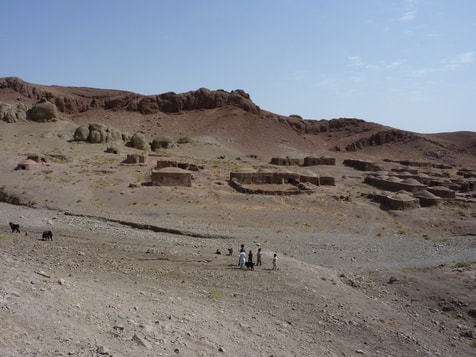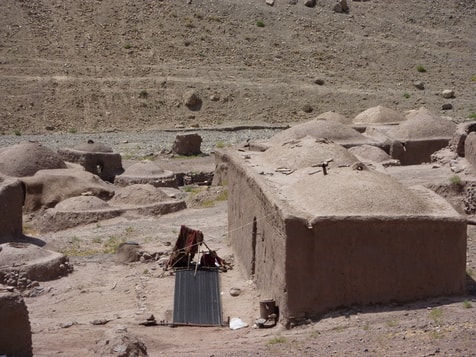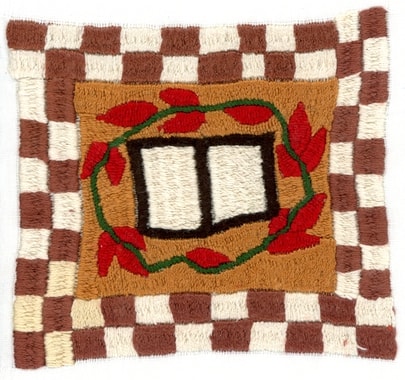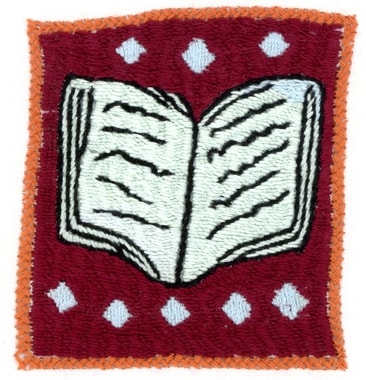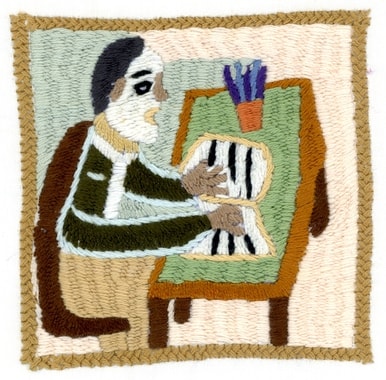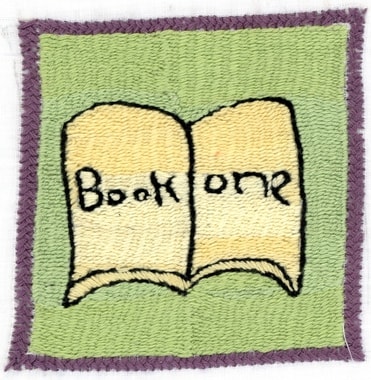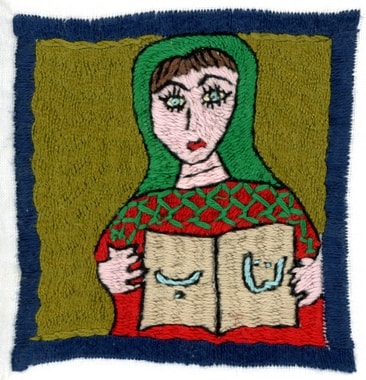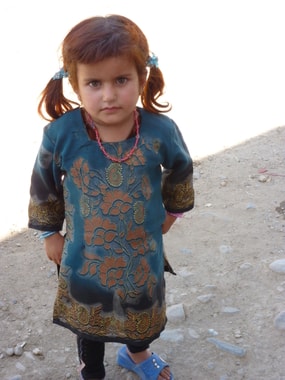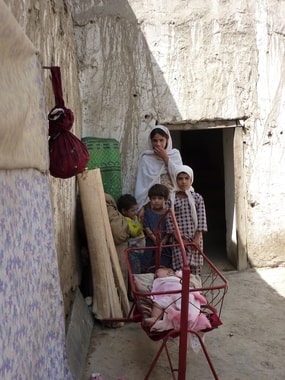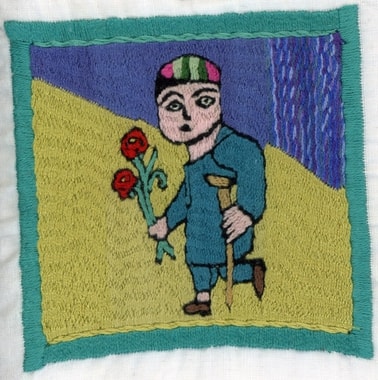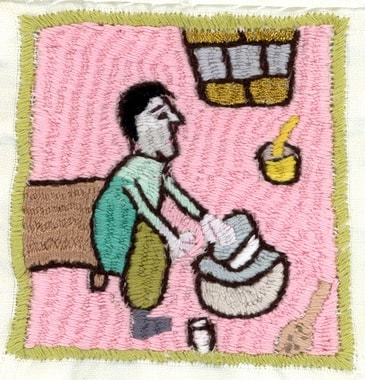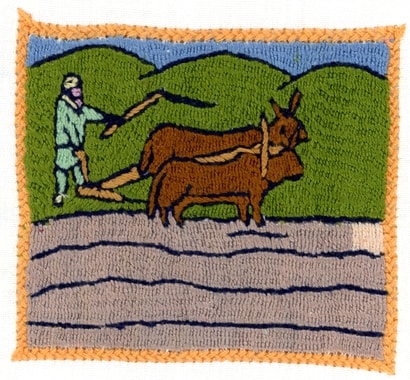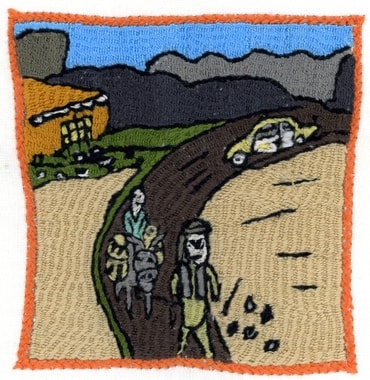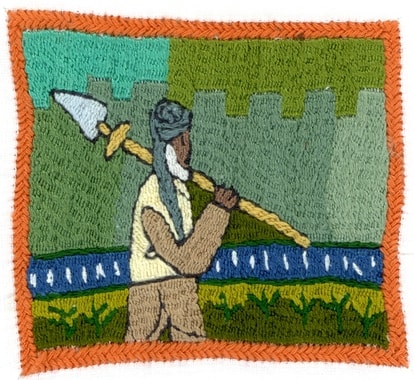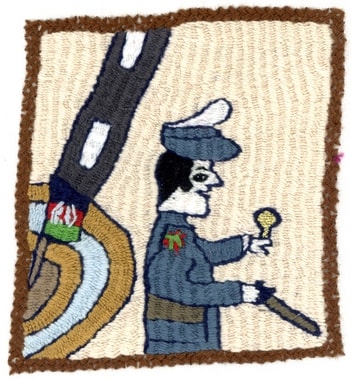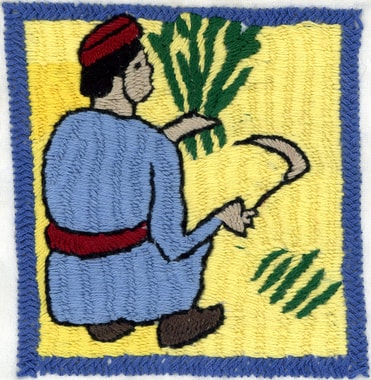Pascale Goldenberg’s 4th travel account - Summer 2009
The most important piece of news is the initiation of a second embroidery project in western Afghanistan.
30th July 2009, landed in Kabul punctually at 6 a.m.; some flights are perfect! I am often asked how best to fly to Kabul. One can fly directly from Frankfurt; the flight takes exactly 7 hours, other options include stopovers.
Khaled awaits me at the airport. Then we are stopped by a police control on the way. The police look through the front window where Khaled and Jahed are sitting, then look at the back seat where I am sitting alone. They let us drive on without delay, saying, “Ah, they are driving their mother around”. So I was identified as an Afghan woman, which means that my precautions were successful: when I left Freiburg I was dressed as an Afghan woman, but without a veil. I am wearing a long-sleeved tunic that reaches just below the knee, long soft trousers and sandals without socks. I put the veil on upon leaving the airplane, mainly to hide my hair.
My sojourn in Herat
I will be spending about a week in and around Herat, as a guest of Rateb and his family. Rateb has moved back to Afghanistan after living in Germany for decades. The family is very hospitable. I communicate with the women using my hands and I speak English with the eldest daughter, who will soon be writing her A-Levels (highschool diploma). Rateb is responsible for the DAI-projects in and around Herat (“around” can mean a distance hundreds of miles). You can take a closer look at these projects on the DAI Website.
The main goal of this visit is to initiate a second embroidery project. Rateb has already smoothed the way. In Sharak, near Herat, is a settlement of Hazaras who have returned from Iran. In this small, growing town (Sharak means “little town”), there is a women’s centre which offers an extensive range of courses. The time had come to meet the women, which we did three times in order to establish a good working relationship and determine the general conditions for the new project. We discussed the prices for the two types of embroidery, the Keshide (a colorful needlework similar to the Venetian bargello) and the Kandaharidusi (similar to the Tshadris – the veiling, completely in white or blue).
The needlework will be stitched exclusively with silk thread provided by the Madeira Thread Company. The women possess almost no traditional patterns, having sold all their belongings for a few Afghanis during the wartime poverty.
The trip to Shotordaran (which means “those that own camels”), where semi-nomads live (who no longer own camels) is awesome. Nearly all the adult men are several hundred miles away with their animals for the summer. I walk around the village, accompanied by 2 children, and look at houses containing several rooms, all domed. I watch women weaving yards of black goat hair for tents. Then I return to the house of the village eldest. His wife Djamaleti is very fit and exudes intelligence and balance. She spontaneously tells us that she is very fond of her husband but that he is very lazy. I mention the felt rugs we are sitting on and we talk about the different techniques; she no longer weaves kelims as it is no longer fashionable and no one is willing to pay realistic prices. But she still makes felt rugs and so-called shepherd’s cloaks, “Shapan nomadi” for personal use. The felt is so thick and strong that it looks like industrial felt. It is unbelievably hard work. She tells us how hard life as a nomad was and how happy she is to have a roof over her head. Djamaleti had 3 daughters as well as her sons. All her sons survived, but none of her girls. When life is very hard, then decisions will be made as to who will be saved and who not!
Frozan the translator and the alphabetization program
Lailuma, who was my translator during my last 2 visits, could not assist me this time. It was very difficult to find a female translator who could translate from German or French. Only via a German friend who is acquainted with an Afghan family in Germany and two other contacts in Kabul, was I able, with a great deal of persuasion, to gain the services of Frozan, a teacher from Kabul who teaches French at the Malalai school (an Afghan-French school).
With Frozan as a skilled educator at my side, meeting the teachers and visiting the lessons was possible on a completely different level. Frozan was very enthusiastic about the 4 completely differently aged and skilled teachers. Each one was able to motivate the girls to attend class in her own individual way. We attended lessons where after awhile Frozan took over the supervision to test the girls. All of them could read and write fluently and in that classroom I could not hold back my tears because it was so unbelievable!








